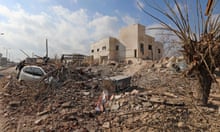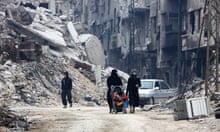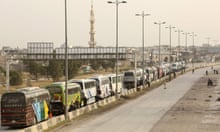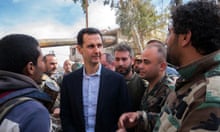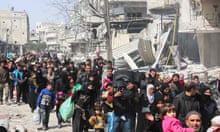Doctors and rescue workers in the besieged Syrian region of eastern Ghouta have said are struggling to cope with another intense bout of what they described as “insane” violence, in which more than 90 people were killed overnight, according to war monitors.
The airstrikes and shelling of the enclave near Damascus led to the postponement of aid deliveries to more than 300,000 people under siege, amid military advances by forces loyal to the regime of Bashar al-Assad.
The suffering was compounded by overnight reports of incendiary weapons and chemical attacks targeting two towns in Ghouta, with doctors reporting symptoms consistent with exposure to organophosphorous or chlorine.
“To all of those outside Ghouta, living in peace and comfort … I wish to tell you that children, women, the elderly and infants are all dying today in full view of the world,” said one rescue worker.
“We are civilians and humanitarian workers, and we cannot face these weapons except by carrying children or women or the injured [from the rubble]. We might die at any moment.”
Doctors on the ground said at least 90 people had been killed on Wednesday as the death toll from a punishing military offensive on eastern Ghouta launched on 19 February approached 1,000 civilians. At least 300 people were wounded in the bombardment.
They said 29 people, including 15 children, were admitted to a medical centre with breathing problems after a suspected toxic gas attack on the towns of Hamoryah and Saqba.
“Most of those who came to me were from one shelter, 15 of them children, some three or four months old, blue in the face, coughing, [with] symptoms of bronchial irritation,” said one doctor who treated the victims.
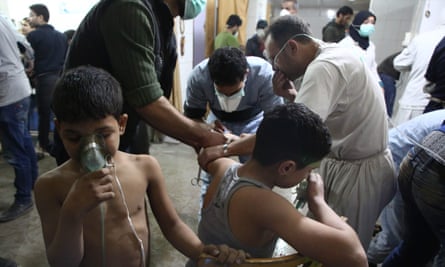
“We have no medicine, I wish the UN would get us some medicine so we can treat these wounded, they’re still here, come and interview them and investigate and test them.”
He added: “I don’t know, I’m even exhausted of documenting everything. I treated people during the 2013 chemical massacre, and this is the worst gas attack I’ve seen since. But what can we do? It’s been five years under siege, bombardment, hunger and nobody cared about us. What can we do? We will continue working.”
The Assad regime has used sarin gas in at least two previous attacks: in 2013 more than 1,000 people were killed in Ghouta in an incident that nearly prompted American intervention in the war, while in April 2017 an attack on the town of Khan Sheikhun killed dozens of people with nerve agent.
Chlorine is not covered by a chemical weapons deal in 2013 that supposedly dismantled Syria’s chemical arsenal, due to its industrial uses. But a number of alleged chlorine attacks have been documented by both opposition doctors and UN investigators.
The violence in eastern Ghouta has persisted despite mounting international condemnation of Russia and the Assad regime, who are leading the assault, and a security council resolution that had called for a month-long ceasefire and the delivery of humanitarian aid. The UN secretary general has called Ghouta “hell on earth” while its high commissioner for human rights has described it as a “monstrous annihilation”.
An aid convoy by the International Committee of the Red Cross, the Syrian Arab Red Crescent and the UN that was supposed to enter the area on Thursday was postponed due to the violence. An earlier convoy this week had to leave before it unloaded all of the food supplies due to the instability.
Nearly half of the food aid could not be delivered, and the UN said Syrian authorities removed some medical and health supplies from the trucks.
“The convoy for today is postponed as the situation is evolving on the ground, which doesn’t allow us to carry out the operation in such conditions,” Ingy Sedky, a spokeswoman for the ICRC, said.
War monitors said the regime’s forces had succeeded in dividing Ghouta in half, tightening the noose around rebel fighters and civilians, who are mostly hiding in underground bomb shelters. The northern half of Ghouta is largely controlled by Jaysh al-Islam, while the southern part is controlled by the Rahman legion, two Islamist rebel groups.
Thousands of people have fled further into eastern Ghouta to escape the continuing bombardment and regime advance.
The Assad regime and its Russian backers may seek separate solutions for each enclave, likely based on demands that rebels leave the area and the forced displacement of civilians, if the military campaign runs into determined resistance. But rebel sources say no serious negotiations on such a plan have taken place.
Meanwhile, the bombardment of civilians continued.
“I had so many wounded, and there are so many who cannot come to me,” said the doctor. “I don’t know if all these weapons are banned internationally or not, but in the space of 10 hours they used all types of weapons. I couldn’t sleep, the bombing did not stop.”


